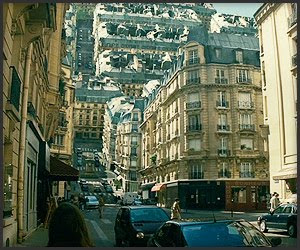Twist in Time
By Kevin Wong
 Usually, I write my film review right after I watch the film. This is when it is freshest in my mind, and I can remember all the details I need to write a comprehensive review. I also like to capture my visceral, emotional reaction to the film, which might dissipate if I wait too long to commit fingers to keyboard. I'll then reflect over the next couple of days and edit the draft accordingly.
Usually, I write my film review right after I watch the film. This is when it is freshest in my mind, and I can remember all the details I need to write a comprehensive review. I also like to capture my visceral, emotional reaction to the film, which might dissipate if I wait too long to commit fingers to keyboard. I'll then reflect over the next couple of days and edit the draft accordingly.After I watched Inception, however, I went straight to bed.
Christopher Nolan's latest, strangest, science fiction film is difficult to pin down. It unfolds in layers, both literally and figuratively, and it's hard to determine what is meant to be deliberately confusing and what is the result of poor screenwriting choices. Nolan's first film, Memento, did not have this effect on me. That film, an interesting exercise in jumbled chronology, had a single, simple plot line that could be followed. I admire a lot of things in Inception, including its ambition, but Nolan has bitten off a bit more than he can chew in this latest outing. The film wants to be two different things, and this compromises what could have been a more direct, and thus more effective, film.
The first thing that it wants to be is an Ocean's 11-esque heist caper. Don Cobb (Leonardo DiCaprio) is the Danny Ocean of sorts - the leader of professional 'extractors' who enter people's unconscious minds to root out otherwise unattainable information. And like Danny Ocean, Cobb has also assembled a crew of professional, multicultural thieves for hire: Arthur (Joseph Gordon-Levitt), a right hand wiseass who's the closest thing Cobb has to a colleague; and Adriadne (Ellen Page), a student and 'architect,' whose job it is to construct the setting of the dream through which they can access their victim's mind. The crew is rounded out by Eames (Tom Hardy), a 'forger' who roleplays necessary roles in the dream; and Yusuf (Dileep Rao) a 'chemist' who tranquilizes the victim with enough sedatives to keep them under while the crew performs their mental heist.
They've been asked by Saito (Ken Watanabe), a businessman with shady interests, to perform a nigh impossible task; rather than extracting a thought or fact from someone's mind, Saito wants the crew to plant one in the mind of a rival businessman.
This, however, proves difficult. In order to plant the thought well and not arouse suspicion, they have have to dig very deeply into their subject's mind. Have you ever had a dream within a dream? Where you have a dream, and then wake up and are still in a dream? Cobb and his crew have to go one more level down, and dig into a dream within a dream within a dream, to do their job effectively.
The intricacies of doing this is the great part of the film. There are visual sequences that adhere to a wonderful sort of dream logic: zero gravity enclosures, upside down cities, bridges being constructed out of spare parts, and time slowed to a jellied crawl. All of this, and the extended, expositional dialogue that explains how it all works, was grin-inducing and engaging in the fullest; I watched these sequences with the interest of a student, wanting to know more about the complexities of this strange, futuristic world.

The 'heist' itself was really enjoyable too. Apparently, time slows down the deeper one pushes into a person's mind, and this makes for some action sequences that were wonderfully edited and visually rich. From a rain-soaked urban backdrop, to a gaudily modern hotel, to a snow-covered, militarized landscape, the film's dreams get more and more compelling the further down they dig.
The best heist films in Hollywood, from The Killing to A Fish Called Wanda, focused on the process of the heist itself, because the filmmakers knew what was most fascinating to focus on. Characterization, in other words, took a backseat to process. And this is how I wish the film had remained: as a science fiction heist film. It's when Nolan turns the film into a thesis about the difference between reality and make believe, between forgiveness and carrying guilt, that the film goes off the rails. DiCaprio plays Cobb as a tortured, mentally unbalanced fellow who, unfortunately, is identical to the same tortured, mentally unbalanced fellow he played in Shutter Island, which was released earlier this year. Just as in that film, he's pining incessantly over a dead woman, and it's an unnecessary complication to what we're really interested in: the intricacies of dream travel.
Come awards season, I can definitely see this film snagging a nomination or two; the first half is done expertly well. Inception has a great look and a clever premise, but it aims to be transcendent, and in this attempt, falls short of its goals. Cobb's psychological problems come to dominate the film, both literally and thematically, and the issues are merely grazed, not delved into deeply enough to make us sympathize with Cobb or any of the associated characters. What could have been a clean, well-drawn plot thread becomes unnecessarily twisted, and I left the theater more puzzled than I ought to have been and more emotionally disconnected than I wanted to be. Inception's audience receives melodrama instead of drama, and is ultimately left out in the cold, wondering what happened to the slick, fun movie they were watching.
Rating: 6.5
To see my ratings system, click here

No comments:
Post a Comment